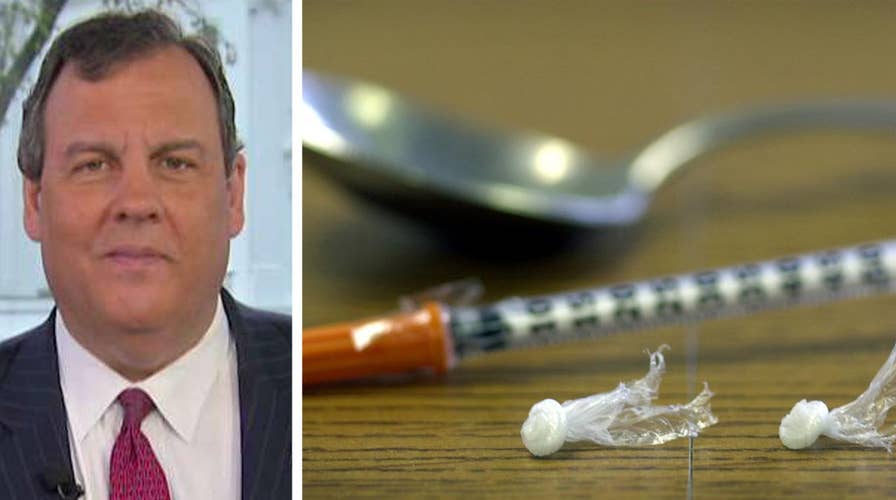Gov. Christie joins WH task force on opioid addiction
New Jersey governor speaks out on 'Fox & Friends' on drug epidemic, Russia investigation, health care efforts
First off, let me say that Chris Christie, in my opinion, has been a highly effective governor who has chalked up- despite formidable obstacles- -- a number of positive, concrete achievements of enormous value to the well-being of the Garden State.
New Jersey has been lucky to have him.
But he has proposed a plan to combat opioid abuse that doesn’t make sense. He has been given bad advice. He needs to hit the reset button and come up with a strategy that will fix this serious problem without creating more problems.
Gov. Christie is absolutely right to make opioid addiction in New Jersey a real priority. As an adviser to the Trump administration on combatting the nationwide opioid epidemic, Gov. Christie knows his home state is suffering more than most.
New Jersey’s rate of heroin overdose is three times the national average and drug overdose is now our leading cause of accidental death. There are roughly 128,000 heroin users in New Jersey, with opioid addiction affecting citizens across a broad spectrum of age and income brackets.
In a budget speech, Gov. Christie proposed funding expanded drug rehabilitation treatment for uninsured New Jerseyans by taking $300 million from the reserve fund of non-profit Horizon Blue Cross Blue Shield of New Jersey, money he termed an “abundant surplus.” There are several things wrong with this plan.
In the first place, good New Jersey corporate citizen Horizon has for 85 years been providing high quality, affordable health insurance in every corner and to every citizen including traditionally vulnerable populations such as the poor or elderly. While it is a not-for-profit, it is not a charity but a uniquely structured entity that paid $545 million in taxes last year, including $207 million to the state and $6 million in local property taxes.
And their reserves – a necessity for any insurance provider – are anything but excessive. In fact, just the opposite – while adequate, they are shrinking due to the increased risk associated with insuring so many vulnerable citizens including those now covered as a result of the ACA.
Horizon’s cash on hand is only enough to cover the cost of 75 days of expected claims, equivalent to just a single day of hospital care for each policyholder. Of all major not-for-profit Blue plans nationwide, Horizon New Jersey has the fourth lowest reserve rate.
The cash they do have in reserve was put there by Horizon policyholders – the same New Jerseyans who would have to replace that money if the Governor took it away. His proposal would do harm – it would increase healthcare costs for Horizon’s 3.8 million members, while putting them at risk of losing coverage in the event of an unexpected health crisis or natural disaster.
This is not the first-time Trenton has eyed Horizon’s reserves. Legislators floated the idea of taking $300 million from Horizon to fund charity care back in 2005. They dropped the proposal when then-State Treasurer John McCormack informed them the plan was illegal and would have failed in the courts. It still would today.
But even if Gov. Christie’s new cash grab did not set the state up for a lengthy, expensive, eventually futile court battle, it would still be a bad idea. It’s directly at odds with the record of commonsense, conservative governance he’s built as governor.
In the eight years before Chris Christie took office, New Jersey endured 115 tax and fee increases.
Gov. Christie has signed off on six balanced state budgets without raising taxes once, and has consistently vetoed tax hikes promoted by the Democratic legislature.
He has stood up for businesses large and small, backing $2.3 billion in targeted business tax cuts and eliminating 2,200 pages of onerous regulations and government red tape.
During his tenure, over 224,000 private sector jobs have been created in New Jersey, dropping unemployment last year to its lowest rate since 2008.
Gov. Christie’s Horizon proposal would trigger higher taxes and increased costs for insurance consumers. This conservative, tax-cutting leader should be the last person to advocate a plan that would impose a permanent backdoor tax increase on New Jersey residents and set a dangerous precedent for state government intrusion into the private marketplace.
There are better alternatives. Charities and other true non-profits can work together to help people suffering from drug addictions. New Jersey’s pharmaceutical industry might also be willing to help out.
I have great respect for Gov. Christie but no responsible person could agree with him on this particular plan.
He should stop and take a fresh look at what he has proposed, and embrace more effective ways to address New Jersey’s opioid problem.
A change of mind here would enhance his legacy and address a genuine crisis for so many people in New Jersey.

